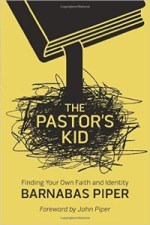Barnabas Piper's Blog, page 88
October 21, 2016
How To Pray For Pastors’ Kids
Why exactly is it that pastors’ kids (PKs) need prayer? What makes them so special? Actually, nothing. They are just like all their peers—the same weaknesses, the same proclivity to sin, and made in the image of God, too. All in all, PKs are a pretty normal bunch.
And there you have it, the reason they need prayer: they’re normal. Yet when you put normal people in uniquely challenging circumstances, things get difficult, and growing up in a family wherein the father’s vocation is full-time ministry is definitely uniquely difficult.
A pastor’s family often functions as the “first family” of the church, setting the bar in all things spiritual and moral. They are the exemplars of ministry and life. They’re always being observed, and with that comes expectations. The church expects certain behaviors and personas from their leaders’ families.
So you can see why it is that a pastor’s kid could use some extra prayer. Growing up is a challenge all by itself—learning, growing, hormones, identity crises, unrequited love, sports heartbreak, relational drama, school, spiritual life, siblings, parents, and more. Now imagine doing all that while a church watches, expecting you to be a good little Christian. Where can a PK hide? Where can she hide her mistakes and her insecurities? More deeply, where can she connect with Jesus deeply and genuinely, not as just another expectation?
Most people in the church love the pastor’s family. They have no intention of adding to the pressure or pain of PKs, so what can they do to ease the burden? More than anything, the church can pray.
THAT THEY WOULD KNOW JESUS
One of the most significant challenges PKs face is a true connection with Jesus Christ. All the knowledge and trivia and Bible memory doesn’t equal a saving relationship with Christ. On the contrary, sometimes knowing all that good stuff actually tricks PKs into thinking they have one. So many PKs know of Jesus, but all the morality, expectations, and knowledge blind them to His heart-transforming reality. Only a miracle of the Holy Spirit revealing Jesus to someone can truly save. Pray this miracle, that Jesus would be visible through all the stuff that happens in His name.
THAT THEY WOULD FIND THEIR IDENTITY IN JESUS
When people grow up under significant expectations, it is natural to gauge themselves by those expectations. Am I what I am supposed to be? Am I pleasing the right people? PKs see themselves as what others want them to be instead of what God made them to be. For PKs, those standards often look very “Christiany,” very moral, very “churchy.” Christian kids know they are not to measure themselves by “worldly” standards but rather by biblical ones, and these churchy standards sure look biblical. But something is amiss. Meeting churchy standards still feels empty.
Why? Because it is the wrong place to find one’s identity. A follower of Christ is a new creation in Jesus. With that comes freedom to live a life made full by honoring Jesus instead of a life made harried by meeting expectations.
THAT THEY WOULD LOVE THEIR FAMILY
Pressure crushes things, and a cracking family is one of the devil’s favorite ways to undermine a pastor’s ministry. It’s an exploitable weakness and a nerve to be jabbed. When a PK crumbles under the pressure of ministry, she often blames her parents. (Sometimes they even deserve it for heaping that pressure on.) More subtly, the practice of being “just so” for the church can carry over into the home and stilt relationships. Instead of honesty, transparency, trust, and love, there is a void between family members.
THAT THEY WOULD LOVE THE CHURCH
PKs see more of the ugly in a church than anyone but the staff does. They see how ministry can pull apart their families. All the expectations can frustrate and embitter them. That’s why some PKs rebel and abandon church altogether. On the other hand, PKs get to see the best parts of the church too—deep friendships, changed lives, needs meet, souls transformed. Pray that the good would outweigh the bad, that they would recognize that there is bad everywhere humans gather, and that the church provides hope and richness like nowhere else.
FOR GRACE
People who grow up in church hear all about grace but often know very little of it. It is God’s grace that reveals Jesus and connects a PK to Him. It’s grace that overcomes and redeems the failures of family and church. It is God’s grace flowing through the church to the PK and through the PK to the church that enables the relationship to flourish. Grace is the thread that ties each of these needs together and the means by which God can grant them. Pray for the miraculous grace that covers a multitude of sins, restores the fallen and the bruised, and ties God’s people together.
This article was originally published for Ligonier Ministries.
For more on serving pastors’ kids well and the challenges they face check out my book The Pastor’s Kid: Finding Your Own Faith and Identity. If this blog is all the reading you can handle you can get the audio book with I read instead. I’m no Morgan Freeman, but it’s not too bad.
October 17, 2016
New Happy Rant: A Political Extravaganza: How Can Christians Defend Donald Trump?
In this episode of The Happy Rant Ted, Barnabas, and Ronnie go a different direction than usual. Instead of bouncing from topic to topic they hone in on this debacle of an election America is facing.
Trump: The worst candidate ever
How in the name off all that is good can anyone defend Donald Trump?
How “Locker room talk” is an absurd euphemism for misogyny and sexual abuse talk.
Is there a way to vote in this election?
 We’d like to thank your sponsor, Logos, the premier Bible Study and sermon preparation software on the market. Today they released Logos 7, complete with new features to take what was great before to entirely new levels. They offer an incredible library of resources, extensive features, and a suite of tools all of which will help serious Bible students, teachers, and preachers research and prepare. As a special offer for you, listener, use code HAPPYRANT7 at checkout to get Charles Spurgeon’s commentary on Philippians for FREE.
We’d like to thank your sponsor, Logos, the premier Bible Study and sermon preparation software on the market. Today they released Logos 7, complete with new features to take what was great before to entirely new levels. They offer an incredible library of resources, extensive features, and a suite of tools all of which will help serious Bible students, teachers, and preachers research and prepare. As a special offer for you, listener, use code HAPPYRANT7 at checkout to get Charles Spurgeon’s commentary on Philippians for FREE.
 We’d also like to thank Missional Wear (or Calvinist Swag if you prefer) for sponsoring. You can find a fantastic selection of apparel, art, mugs, pint glasses, and more there. And it’s good quality, artistically designed gear too! Check out their new laser etched journals too. Be sure to use the code HAPPYRANT at checkout for a listener special deal – a sweet sticker featuring our logo.
We’d also like to thank Missional Wear (or Calvinist Swag if you prefer) for sponsoring. You can find a fantastic selection of apparel, art, mugs, pint glasses, and more there. And it’s good quality, artistically designed gear too! Check out their new laser etched journals too. Be sure to use the code HAPPYRANT at checkout for a listener special deal – a sweet sticker featuring our logo.
Feel free to hit us up on Twitter at @HappyRantPod or on Facebook or via email at HappyRantPodcast@Gmail.com with any topic suggestions or feedback. We love hearing from listeners!
To listen you can:
Subscribe in iTunes.
Listen on Stitcher.
Leave us a rating in iTunes (it only takes 1 click and it really helps us).
Listen using the player below.
Episode #108
October 12, 2016
Joy Come In The Morning, But Not Tomorrow
Joy comes in the morning. But when does morning come?
God promised us this would be true. But what if the morning doesn’t come tomorrow? I don’t mean what if tomorrow never comes but rather what if tomorrow is not the morning when joy comes? This is not a promise built on the premise of “sleep on it.”
Nothing I have encountered in life has showed me that if I go to bed sad or hurt it will be all better tomorrow. Sometimes the morning brings with it a fresh perspective. Rest gives us patience reserves we lacked the day before. But these aren’t joy, they are means of coping and processing. Joy is something deeper, something more profound. And it comes with more than a good night’s sleep.
Joy comes with the dawn.
Joy comes with the dawning of a new season of life.
Joy comes with the light of hope and a future.
Joy comes when we can see God at work by the light of a new day.
Joy comes when the darkness of our pain and difficulty gives way to the warmth and brightness of the Spirit working in us.
Circumstances do not change overnight most of the time and neither do our lives and hearts. We change over time. We see more over time. We strain our eyes to see in the dark until they burn. We want to give up, but we know that if we keep looking we might see something, anything. And then dawn comes, faintly at first, then with growing light. The chill breaks, our eyes begin to make out what lies ahead.
This is joy coming in the morning. It doesn’t mean tomorrow. It means when the darkness breaks. When, not if. That is the promise, that a new day will come. That joy will come. We can make it through the dark, cold night because we know it’s true.
October 10, 2016
New Happy Rant: Buddy Parents, Halloween, and Clowns
In this episode of The Happy Rant Ronnie returns from his pilgrimages and quests to hoping Ted and Barnabas for a riveting discussion of important and timely topics.
Should we be our children’s friends and buddies? Should parents be a “parent, not a friend”? Is there middle ground?
It’s Halloween season (yes, it now has a season) and things bout to get crazy with some trunk or treat, some slutty costumes, and some weird reformation stuff.
Clowns. Clowns everywhere. Clowns haunting our dreams and stealing children.
 Check out Olive Tree, our sponsor this week. It is one of the best mobile Bible reading and studying apps and sites out there. They also offer numerous Christian books and Bible study resources for sale to be used in conjunction with scripture. They are affordable, accessible, and a fantastic platform. If you use the code RANT at checkout you can get a 20% discount too.
Check out Olive Tree, our sponsor this week. It is one of the best mobile Bible reading and studying apps and sites out there. They also offer numerous Christian books and Bible study resources for sale to be used in conjunction with scripture. They are affordable, accessible, and a fantastic platform. If you use the code RANT at checkout you can get a 20% discount too.
Like every week, we want to offer a big thank you to Resonate Recordings, the fine folks who make us sound listenable. If you are looking for great people to help your church put out recorded sermon audio or help you with a podcast they’re your people.
Feel free to hit us up on Twitter at @HappyRantPod or on Facebook or via email at HappyRantPodcast@Gmail.com with any topic suggestions or feedback. We love hearing from listeners!
To listen you can:
Subscribe in iTunes.
Listen on Stitcher.
Leave us a rating in iTunes (it only takes 1 click and it really helps us).
Listen using the player below.
Episode #107
October 4, 2016
The Super Power For The Curious Mind
August 1, 1981 is a date that shaped an entire generation, whether or not we know it. On that day MTV launched with the music video Video Killed the Radio Star by the Buggles. MTV became one of the most powerful entertainment forces throughout the 80s and 90s. They launched and elevated careers. They helped popularize reality TV. They were a force despite the fact that they didn’t really, actually kill off radio hits with their music videos.
For the current generation it seems an apt parallel might be “Google killed the curious mind.” Google is the evil empire making us all dumber, ruining education, and providing easy answers to hard questions. Instead of thinking we type, and we’re all worse for it. Smart phones for dumb people, right?
Certainly we live in a day with more information available more easily than at any time in history. Cities used to be known for their libraries. Universities were known for their collections of written works. Now we carry gigabytes of memory and almost unimaginable computing power in our pockets. Several of the quotes you’ve read throughout this book were found through a simple Google search, citations and all. We can connect to this magical electronic web of information from just about anywhere except my grandma’s house in rural Georgia. It is remarkable the information we have; it’s truly the information age.
Humans always gravitate toward the easiest option. We do what’s easiest, so naturally we’re going to use Google instead of memorizing stuff. Does that make this generation, with knowledge in their pockets instead of their backpacks and lockers, dumber? Probably a little bit when it comes to memorizing information. But absolutely not when it comes to having answers. We have more ability now to solve problems, discover truth, and make connections than ever before. Time will tell how our minds are affected by this new way of learning (or not learning, as the case may be), but it is unfair to accuse people of being dumber because of the internet.
This access can fool us into thinking we are smarter than we are, though. It allows us to think less and search more. We are lazy, so why think when we could ask Siri to look something up for us? A nasty bi-product of this can be that we lose curiosity. Why ask and notice when all we need to know is at our fingertips?
WHAT DOESN’T KILL YOU MAKES YOU STRONGER
Except that Google should be a super power for the curious person! Rather than deadening our minds it should open up a world of opportunities. We have answer to questions readily at hand which means we can ask new and better questions and learn even more. No longer is “I don’t know” an acceptable answer in most cases. The internet is a universe in itself with so much to observe and engage.
Having information and being curious should feed one another, grow one another. Information is the fuel of curiosity. Curiosity is active and intentional. It uses available tools to their fullest extent and finds new ways to use them. It doesn’t let answers sit out there unused and undiscovered.
Curiosity sees the world of internet interaction as one worth understanding and engaging just like other aspects of culture and society. Curiosity sees that the internet is not just a hub of information, it is a hub of human connections and it plunges in headlong to better grasp them and make the most of them. Remember, curiosity seeks to love our neighbor as ourselves and be shaped by the fruits of the Spirit.
The thing about curiosity is that it sees endless opportunity for discovery, for learning, for relationship. It seeks truth in all places. Where others declare doom it looks for light and opportunity. It does not settle for the easy or lazy. It takes action with heart and mind with whatever means, whatever methods, and whatever propensities the curious one has at his or her disposal.
 This is an excerpt from my forthcoming book,
The Curious Christian: How Discovering Wonder Enriches Every Part of Life
that is due to be released in early 2017.
This is an excerpt from my forthcoming book,
The Curious Christian: How Discovering Wonder Enriches Every Part of Life
that is due to be released in early 2017.
October 3, 2016
New Happy Rant: Responding to Internet Critics, Tebow Talk, and Marvel Comics
In this episode of The Happy Rant Ted and Barnabas discuss a number of pressing topics while Ronnie tries to find himself in the Alleghenies or some such place.
We received some rather scathing criticism via email this week. What is the best way to respond to such shots fired?
Tim Tebow is playing baseball which means the Tebowites have a savior to worship once again. Yippee.
What do we think of the Marvel Universe and phenomenon? Which super heroes are best and which would we want to be if we were super heroes?
 Check out Olive Tree, our sponsor this week. It is one of the best mobile Bible reading and studying apps and sites out there. They also offer numerous Christian books and Bible study resources for sale to be used in conjunction with scripture. They are affordable, accessible, and a fantastic platform. If you use the code RANT at checkout you can get a 20% discount too.
Check out Olive Tree, our sponsor this week. It is one of the best mobile Bible reading and studying apps and sites out there. They also offer numerous Christian books and Bible study resources for sale to be used in conjunction with scripture. They are affordable, accessible, and a fantastic platform. If you use the code RANT at checkout you can get a 20% discount too.
Like every week, we want to offer a big thank you to Resonate Recordings, the fine folks who make us sound listenable. If you are looking for great people to help your church put out recorded sermon audio or help you with a podcast they’re your people.
Feel free to hit us up on Twitter at @HappyRantPod or on Facebook or via email at HappyRantPodcast@Gmail.com with any topic suggestions or feedback. We love hearing from listeners!
To listen you can:
Subscribe in iTunes.
Listen on Stitcher.
Leave us a rating in iTunes (it only takes 1 click and it really helps us).
Listen using the player below.
Episode #106
September 29, 2016
That’s Not What I ordered
“Sir, this isn’t what I ordered. Please take it back.”
How many times have you uttered these words at a restaurant? I actually never have because I have this weird hang up about sending something back to the kitchen. I’ll pretty much eat whatever is brought to me in whatever condition it is brought. Unless it involves Kale.
But that’s not how I pray. I often ask God to take it back.
God, I know asked for increased faith, but this thing you have given me to actually increase it? Not awesome. Please take it back.
God, I wanted the problem fixed. I didn’t want to learn and grow through the problem. Please take it back.
God I wanted to feel better and be happy not learn that there’s something deeper and more lasting than feeling nice when I cling to you. Please take it back.
This is not what I ordered. As if God is a waiter serving up made-to-order dishes from a cosmic kitchen. I am so presumptuous.
God is not the waiter; He is the chef. What is more, he is the chef who knows precisely what meal will satisfy if we simply trust Him. He hears our wishes, recognizes our desires, but knows what is best for us. We order something, but he gives us something better.
Yet we continually try to send it back. We refuse to recognize that the chef is the expert, the perfect omniscient expert who never gives us anything but what we need. This is hard to accept because often what we are served is not to our liking – it is bitter, tough, or dry. Yet it is what we need. Sometimes the portion seems to small and sometimes it seems too much for one person. Yet it is what we need.
This is no “You’ll eat what is served and you’ll like it!” scenario. At any time we can leave the chef’s table in search of food we like more. We can go make our own meals – as if we could prepare something better. We can buy something elsewhere – as if another chef is better. We can grab the first thing we find for a quick bite – only to be reminded later the price we pay for convenience.
What we learn over time is not only that the chef’s table is the best place to dine, but also how to order. No longer do we try to send it back when we get something not to our liking. Sometimes we even order exactly the right thing. Most of the time, though, we learn to say, “Whatever the chef thinks is best.” He delivers and we eat, maybe not always with relish but always to our health and satisfaction.
September 26, 2016
The Man Who Made Me Love Basketball
Doug West, Sam Mitchell, Poo Richardson, Isaiah Rider. Names ring a bell? Probably not unless you were a fan of the expansion Timberwolves from 1989-1995. They were about the best the team could offer up and weren’t really much to root for.
But in 1995 that all changed. They drafted an impossibly skinny kid from some military school in South Carolina with a slightly checkered history and endless potential. Folks said he ran like Jordan, glided like Drexler, and had the makings of a genuine jump shot. Oh, and he would toss that weak jumper into the second row.
12-year-old me was intrigued. I wanted to like basketball and just needed a reason. Maybe this Kevin Garnett kid, THE Kid, was it.
For the rest of my junior high, high school, and college years he absolutely was. Kevin Garnett taught me to love basketball. He taught me to really love basketball, to love the spectacular and the sublime, to love highlights and explosions, to love the subtleties of the game, to love teamwork and unselfishness, to love defense, to love passion and energy, to love in spite of disappointment. He embodied all of those things.
Kevin Garnett was the original Lebron. The current one is the finished and better product, but KG was the prototype. He was positionless because he could do everything and do it better than the guys who actually played the positions. He was so unselfish that he was criticized for it. He could score in bunches. He practically combusted with passion and energy. He was unlike any other player in the league. He was one of those players that pundits and analysts compare other guys to but they never compare him to anyone. He dominated the defensive end – like really dominated – like made Wally-freaking-Sczerbiak a palatable player at that end of the floor dominated. He dragged garbage rosters to the playoffs year after year only to be defeated by better teams. And the moment he had real talent around him he went to the conference finals and later on to win a championship.
I wasn’t heart broken when KG was traded from the Timberwolves to the Celtics because I knew it had to happen. He deserved better, and I wanted better for him. Yes he was the highest paid basketball player in the league but he had earned every penny for the Wolves. Without him they were a non-entity. So when he won a title with Boston I cheered. I may have teared up a little, hard to say since that was a few years ago.
Then he came back to Minnesota. He wasn’t the same KG. He wasn’t THE Kid. He was old enough to be that kid’s dad. But he was back! And he looked right in that wolves uniform. He popped a few jumpers, coached up his teammates on defense, and even dunked on Blake Griffin for old time’s sake.
And now he is leaving the league for good.
Players retire all the time. But this is the only time a player will retire who made me, made me, love basketball. KG made basketball real in Minnesota. He made tens of thousands of kids love basketball and just as many adults. He embraced Minnesota and Minnesota embraced him; not many athletes do that.
Waving goodbye to a childhood hero is a unique feeling, equal parts happy memory and somber reality (reality being: we are old now). I am thankful I got watch KG. I am thankful my daughters got to see him play, just for a few minutes last Christmas. Some day they’ll be able to say they saw a hall of famer, a one-of-a-kind player even if the seats were bad and they barely remember.
The NBA will miss KG, but not as much as Timberwolves fans. He won’t be duplicated nor will he be forgotten. Thanks for teaching us, for making us, love basketball, KG.
Now go to that YMCA in Malibu and taunt some old men in knee braces.
New Happy Rant: Worship in Weird Places, Gut Check with Ted, and Guilty Displeasures
In this episode of The Happy Rant Ted and Barnabas discuss the following while Ronnie galavants around middle America like John Steinbeck:
Why is it that so many Christian organizations feel the need to wedge worship into everything from business meetings to sports to wherever?
Gut check with Ted covering Pumpkin Spice, NFL penalties, and more
We share our guilty displeasures. These are things we don’t like but feel like we ought to since so many other people do.
 We have a new sponsor this week – Ever Accountable. It is an accountability app for all operating systems and mobile devices that will report any online activity, including that which happens within other apps like Facebook or Twitter. For couples and for parents with teens, tweens, or other kids on mobile devices this is a fantastic tool. It will open the door for conversations that need to be had and help build a sense of trust. And they have an offer that you would be dumb to pass on – 60 days free with no strings attached or small print. Just use the code HAPPYRANT to redeem your trial and get started.
We have a new sponsor this week – Ever Accountable. It is an accountability app for all operating systems and mobile devices that will report any online activity, including that which happens within other apps like Facebook or Twitter. For couples and for parents with teens, tweens, or other kids on mobile devices this is a fantastic tool. It will open the door for conversations that need to be had and help build a sense of trust. And they have an offer that you would be dumb to pass on – 60 days free with no strings attached or small print. Just use the code HAPPYRANT to redeem your trial and get started.
We’d like to thank your sponsor, Logos, the premier Bible Study and sermon preparation software on the market. Today they released Logos 7, complete with new features to take what was great before to entirely new levels. They offer an incredible library of resources, extensive features, and a suite of tools all of which will help serious Bible students, teachers, and preachers research and prepare. As a special offer for you, listener, use code HAPPYRANT7 at checkout to get Charles Spurgeon’s commentary on Philippians for FREE.
Like every week, we want to offer a big thank you to Resonate Recordings, the fine folks who make us sound listenable. If you are looking for great people to help your church put out recorded sermon audio or help you with a podcast they’re your people.
Feel free to hit us up on Twitter at @HappyRantPod or on Facebook or via email at HappyRantPodcast@Gmail.com with any topic suggestions or feedback. We love hearing from listeners!
To listen you can:
Subscribe in iTunes.
Listen on Stitcher.
Leave us a rating in iTunes (it only takes 1 click and it really helps us).
Listen using the player below.
Episode #105
September 21, 2016
I hate That Guy – What Hate in Sports Really Means
“I hate that guy.”
I cannot tell you how many times in my growing up years—ok, fine, and my 20s—I said this phrase about Brett Favre. He was the bane of my youthful fandom. I grew up just a few blocks from the Metrodome in Minneapolis and direct center of the purple haze of Vikings fandom. And Favre was the nemesis. He ruined so many Sundays. And then he had the audacity to sign with my favorite team for the ill-fated 2012 season which was even worse.
Favre’s recent well-deserved (I reluctantly admit) induction into the NFL Hall of Fame reminded me of all this and brought back a million memories. And inside me welled up that old feeling—“I hate that guy.” But only in that sports-fan way and with a healthy dose of respect mixed with nostalgia.
Three years ago I moved from Illinois to Tennessee where the sky glows orange and the fans chant “SEC, SEC, SEC!” Nowhere in the United States are fans so irrationally rabid as in SEC football country. It divides families, if only for particular weekends. Fans fight and jeer. The wrong colored shirt will get a person mocked by passers by. These fan bases and teams really hate each other.
At its lightest, hatred in sports is an expression of exasperation or annoyance. At its ugliest it can turn violent as fans attack one another or lead to embittered feuds. But what is hate in the realm of sports? What do we mean when we say it? And what does it say about us as fans or athletes?
WHAT IS THIS HATRED?
Usually the word “hate” means that one person wishes ill on another – injury, misfortune, or even death. Hate is antithetical to love, and love is the golden rule. Hate has no place in the heart of a Christian toward other people. So what does it mean when fans or players or coaches “hate” other fans, players, or coaches?
In sports it often means exaggeration, the misuse of a strong word to mean something weak. When I said I hated Brett Favre I didn’t want him dead or injured. I just couldn’t stand how he torched my favorite team or the aplomb with which he did so. It was like saying “I hate olives” or “I hate cats.” Well, that’s not fair—I do have ill will toward cats.
In a world where every restaurant is the best or worst and every road trip is “epic” it make sense that feelings of frustration and a feeling of competitive incompetence and incapacity would lead someone to use the word “hate.” We’ve deprived words of their meanings so regularly that we barely even notice.
Except when “hate” actually means hate.
Sometimes fans do wish ill on a player or another fan. Sometimes they do attack in a parking lot after a game or on twitter with vile slurs. Hate sometimes does mean that one person wants to see another injured or humiliated. It does mean that one person takes great pleasure at another’s misfortune.
Maybe a more accurate word than sometimes is “often.” It happens regularly. We turn on each other often as fans and competitors. We hope the worst for others and are vile in our words and wishes. Sometimes hate is hate, full and unfettered.
WHY DO WE HATE?
What do we get from hating, what is the benefit? Most hatred stems from fear. It is an extreme, vitriolic, visceral reaction to the fear that something will happen that we don’t like. So the real question is what is it about sports that causes such fear to lead to hatred?
The answer is identity and all the threats to it that come through sports. When we decide to find our identity in the performance of a team, a player, or our own performance we run a great risk.
Any loss, embarrassment, or being shown up is not merely frustrating but a threat to us and threats must be fought off. If they happen consistently we become insecure and rattled and that leads to patterns of anger and spite.
Too often we confuse winning with being superior. Yes, winning means that we have a superior score, but says nothing about our identity – not really. But we often choose to believe it does.
The inverse is that losing means we are inferior, and nothing is worse than that. So losses of any kind are terrifying and humiliating. So whether we win or lose it is easy to turn toward hatred if our identity is in sports. If we win we hate those we perceive to be inferior and any threat they may pose to our status. If we lose we hate those who defeated us and anyone else who reminds us of our humiliation.
PUTTING HATE AWAY
Competition is a pursuit of excellence. Yes, they keep score. Yes, there is a win column and a loss column. But ultimately it is about pursuing your very best.
As a fan it is, or should be, about appreciating this pursuit. Wins do matter and so do losses , but neither determine the value of the competitor or any fan wearing their colors. Losses sting. Wins exhilarate. Neither define. When we lose this perspective we lose all the good that sport has to offer and we devolve into haters.
If we make idols out of athletes or victories or teams or coaches or our own pursuit of success in sports we will become hateful when our idols are threatened. And they will be because everyone has a bad game—everyone loses. What then? Will we lose the joy sports bring because we decided wrongly what that joy should be? Will we be embittered because we hung our hopes on a hook that doesn’t exist?
It is one thing, likely a foolish one, to say we “hate” such-and-such a player. It is another thing entirely to feel real loathing and want to act on it. Those feelings are indicators that our competitive and spiritual compasses both are out of whack. We have lost sight of who we are as God made us to be and what sports are as God made them to be.
And we have lost sight of what God made the object of our hate to be as well. Sport should be a magnificent expression of the image of God, but when we hate we steal that from others and allow ourselves to be blind to it.
This was originally posted for Athletes in Action and is used with permission.





